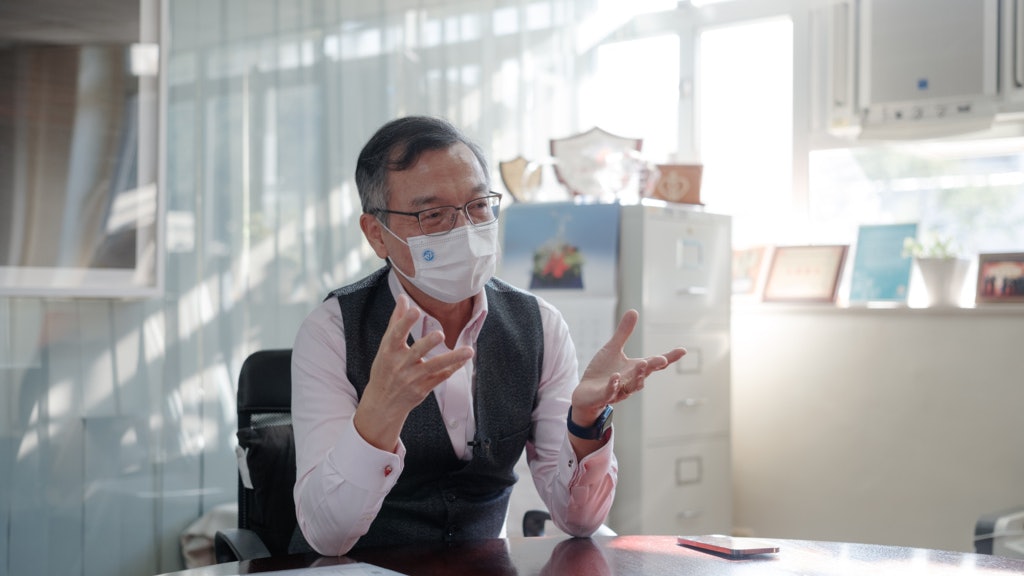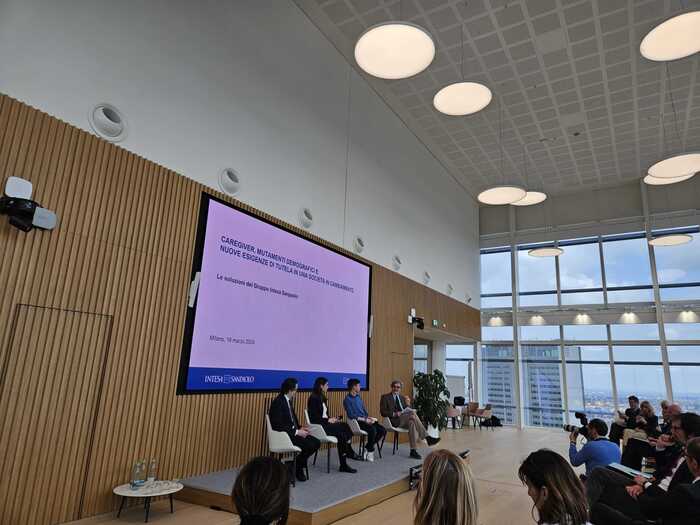"In a civilized society, this is a tragedy." - Caregiver homicide has become one of the mainstream homicides in Hong Kong in recent years. It involves major issues from "population aging" to "community governance", but the SAR government has not followed up In an interview with "Hong Kong 01", executive council member Lin Ching-choi, who is an important promoter of the elderly care policy, said frankly, "Sometimes it takes a tipping point (trigger point)" before it is possible to promote major changes and reduce the recurrence of tragedies, because Hong Kong's social culture and political ecology combine to form this unfortunate reality - the relationship between people is broken, the concept of mutual help and love is challenged, the social safety net is leaked, and as long as the society still fails to build a consensus to support caregivers, the government will No pressure and motivation to prioritize.
Lin Zhengcai repeatedly emphasized that the government undoubtedly shoulders the greatest responsibility, but the whole society must rethink: as long as everyone is willing to go one step further and let caregivers feel that society has not abandoned them, "I believe we have enough strength to support them."
"Save the Caregivers" Series Report
(Part 5)
Lin Zhengcai believes that Hong Kong's social culture and political ecology together constitute many caregiver tragedies.
(Photo by Ou Jiale)
Government snubbing caregiver tragedy: 'Sometimes you have to wait until the tipping point'
Parents kill daughters, sons kill fathers, mothers kill children, fathers kill daughters, old husbands kill old wives—in the past 2022, there have been five ethical tragedies related to caregivers, that is, every two and a half months on average A family is torn apart by a caregiver who is overwhelmed.
These scenes of caregivers who are old, weak, sick, and disabled "depend on each other and kill each other" have sounded a serious alarm for Hong Kong. It is urgent for the SAR government to adjust its governance thinking and reallocate resources to deal with major issues ranging from "population aging" to "community governance". issue.
However, the authorities have not responded positively so far, and those tragedies have become cold numbers.
"The problem of caregivers can be said to be an 'invisible disease'. You may not see it usually, and you won't have "I am a caregiver" on your forehead, but they do face many difficulties." Concerned about elderly affairs for nearly 20 years Lin Zhengcai lamented that it is precisely because the caregivers are relatively hidden, it is not easy to find themselves, and there is no pressure group to deliver letters and protests, so when the government formulates policies, it often does not give priority to their demands; The term government finally entrusted Polytechnic University to conduct and publish the "Major Report on the Consultancy Study on the Needs and Support of the Elderly and Disabled Carers in Hong Kong". However, due to the different needs and difficult definition, the relevant policy still faces the big problem of "how to implement it".
In Lin Zhengcai's view, the most difficult "landing" problem is that the whole society has not yet reached a consensus on "the need to jointly support caregivers". "If even the society thinks it is not important, the government will not take care of it."
However, this statement is inevitably suspicious-one of the meanings of the existence of the "government" is to make good use of power and resources, actively solve social problems, and minimize the occurrence of tragedies. If the authorities stick to the "If it ain' Isn't the mentality of "t broke, don't fix it" to "force" more and more caregivers to a dead end?
"Unfortunately, it can be said that regardless of the political system or the political ecology of Hong Kong, tragically speaking, the reality is like this." Lin Zhengcai explained the "Primary Healthcare Blueprint" that was finally released recently, 35 years late, as an example. The issue of "primary medical care" has been discussed by the British Hong Kong government and the SAR government, and there are quite sufficient reasons for its implementation. However, due to the "preventive" nature of the work, it cannot win "votes" politically, so it has been delayed for many years. Until recent years, public medical care The system has repeatedly exploded. For example, the waiting list for specialists has been counting for years, and the supply of emergency beds is in short supply. The public finally realizes that "it turns out that accidents will happen" and "it turns out that it is not as good as imagined." Only "primary medical care" can take the first step.
"In a civilized society, this is a tragedy." Looking back at the tragedies of caregivers in recent months, Lin Zhengcai is also very helpless. "Sometimes it is necessary to wait until a tipping point (trigger point)" can be promoted to make major changes, thereby reducing the recurrence of tragedies .
But can Hong Kong afford to wait?
Who can guarantee that the caregiver's "bomb" will not lead to another "governance storm"?
The "Caring for Caregivers Platform", which is composed of 20 social welfare organizations, calculated last year that there are at least nearly 1 million co-living caregivers in Hong Kong.
(profile picture)
Passive support is fragmented and complex: "I've heard all these problems"
According to the Census and Statistics Department's "2016 Population By-census Thematic Report: Elderly", there were more than 150,000 elderly people living alone in Hong Kong at that time, and nearly 300,000 elderly people only lived with their spouses. There is a need to take care of yourself or take care of the elderly.
The "Caring for Caregivers Platform" composed of 20 social welfare institutions calculated last year that there are at least nearly 1 million caregivers living together in Hong Kong, who are responsible for taking care of 130,000 elderly people in need of assistance, 248,000 chronically ill, 244,000 people with disabilities, 53,000 children with special educational needs, 90,000 people with intellectual disabilities, and 310,000 children aged 0 to 6.
"Elders living alone, elders with two elders, and caring for the elderly with the elderly were not so serious more than 10 years ago." Lin Zhengcai mentioned that in recent years, social movements have caused tears, and the new crown epidemic has brought barriers, and the relationship between people has become disintegrated. , "A greeting in the past may have been the "last straw on the camel's back" for the caregivers", but now there are no more, and there are more unfortunate incidents.
He is worried that under the "immigration wave", many children will leave their hometowns alone, and the problem of caregivers will become more serious.
In fact, problems are everywhere.
The 70-year-old sister Qin is a typical case of "caring for the elderly". She has to take care of her 86-year-old husband who suffers from cognitive impairment and abuses out of control from time to time. During the hour, I kept mentioning that "I may be the protagonist of the next tragedy".
Ah Sheng, who is in his 50s, is a caregiver under the "immigration wave". Since his brother has been away from Hong Kong for many years and his sister has suddenly moved abroad, he can only take care of his 88-year-old mother alone, which makes it difficult for him to balance personal work and care. The burden and the rhythm of life have also been disrupted, and it seems helpless.
In all these cases, it is not that the government does not know how to provide support, but it just fails to provide sufficient support
(see table)
.
At present, the authorities mainly provide limited support to caregivers through measures such as living allowances, respite services, "centre-based" community support, "home-based" community care, and community care service vouchers for the elderly.
However, the relevant policies have long been criticized: one is fragmented, lacks coordination, and fails to clearly define support targets; the other is divorced from reality, with limited places, and there is a gap with the real needs of caregivers—for example, respite services are only for the elderly Providing 230 designated day respite places and 330 designated residential respite places is a drop in the bucket for hundreds of thousands of elderly caregivers.
Sister Qin also said that some home-based support services have too many monks and too little food. Even if they apply, there is no arrangement in the end.
For her, all kinds of measures are actually "useless to talk about, you have to help me solve practical problems", such as increasing the amount of living allowances, relaxing the application threshold, and allowing other assistance to be received at the same time. At least it can relieve financial pressure and provide for her husband. Buying nutritional milk powder and adding a bed warming blanket, so that she can have more money to take a break.
Ah Sheng also believes that government support is one-sided, scattered, and complicated. For example, a social worker once visited home to help his mother do sports, but when he asked if there was support for caregivers, the other party actually pointed out that he was only responsible for the rehabilitation of the elderly. Inquire online by yourself.
"On the surface, the measures can help us." But in fact, he needs more knowledge of caring for the elderly and personal psychological counseling to help him cross many psychological barriers.
"I have heard all the questions you just mentioned. It is indeed difficult for caregivers to understand how the entire (caregiver support) system works." Regarding the gap between government support policies and caregivers' needs, Lin Zhengcai He thinks that the problem does not lie in the lack of resources, but in "there are so many types of services and they are quite complicated that even people in the industry may not be fully aware of them. I believe that only professionals can understand each service."
He suggested that the government concentrate resources on strengthening "case management" services, especially hope that the elderly centers under review will speed up the transformation and increase case managers to provide "one-stop" help for caregivers who are willing to receive services. After some complicated and high-risk cases, and then guiding them to make good use of the entire support system, including government resources or social forces, many problems can be easily solved.
However, the premise of effective "case management" service is that caregivers can be seen.
Lin Zhengcai mentioned that most of the tragedies of caregivers that have occurred in recent months have not been followed up by social workers. "If we have been contacted by social workers, but we can't catch the vulnerable position of caregivers, then we can reflect on how to do better. But in the end The difficulty is that the (accident) caregiver is not the recipient!" He explained that all existing social service mechanisms require the recipient to ask for help, "You have to raise your hand and say you need services, but if there are no needy people If you are willing to raise your hand, what else can we do to help them?"
But why is the Government playing a passive role?
Shouldn't we take the initiative to build a "safety net" for caregivers?
Lam Ching-choi suggested that the government concentrate resources to strengthen "case management" services, and let case managers provide "one-stop" assistance to caregivers who are willing to receive services.
(Photo by Ou Jiale)
The social safety net is riddled with holes: 'We really need to think'
"This safety net cannot be built by the government alone." Lin Zhengcai believes that although the government has the responsibility to provide support to caregivers in need, the bottom layer of the safety net should be jointly constructed by every citizen, "but this is our weakest As part of that, especially in recent years, I think we really need to think about how we can rebuild our social safety net together.”
After an hour and a half of the interview, Lin Zhengcai reiterated at least ten times that "we really need to think about it" - "we" refers to the government and society, and what "needs to think about" is the application from "governance philosophy" to "social culture". There are changes.
The first problem that needs to be changed is that Hong Kong lacks a long-term vision, fails to prevent the passing of time, and does not understand dynamic governance.
"Hong Kong doesn't like long-term planning. It doesn't like to dig out serious problems that are invisible on the surface and clean them up. Otherwise, Chairman Xi would not remind us repeatedly to solve deep-seated problems." Lin Zhengcai said , The shortcomings of "eating from habit" and "not seeking to understand" are the root causes of social problems that are hard to return, causing us to treat many crises with indifference.
The same is true of everyone's belated awareness of "primary medical care" in the early years, and the lack of emphasis on "caregiver issues" today, because we have not taken seriously what "population aging" and "coexistence with the elderly" are all about.
Lin Zhengcai pointed out in an exclusive interview with "Hong Kong 01" as the chairman of the Elderly Affairs Commission in 2018, "Many people still mistakenly believe that population aging in Hong Kong is just a 'current process', and that there is still a buffer period before entering population aging ", but in fact Hong Kong has stepped from an "aging society" to a "super-aging society". One after another.
Lin Ching-choi was worried back then, and he used the metaphor of "the tortoise and the hare" to call on Hong Kong to catch up. After four years, it cannot be said that the government has made no progress, but the results are different. What is most gratifying to Lin Ching-choi is that the general public has begun to accept the "safety at home" policy. He understands that the wishes of the elderly to stay at home should be respected, and they should not just be sent to residential care homes for the elderly; The goal of "waiting time" has also taken a big leap forward, with the waiting time reduced from a peak of 18 months in 2018 to 5 months by the end of 2021.
The population aging behind caregivers is closely related to many issues, including home care, housing shortage, family structure, neighborhood relations, community governance, social welfare, gerontology, etc.
(File photo/photo by Zhang Haowei)
The second problem that needs to change is that Hong Kong is not used to thinking about structural issues, nor is it used to looking at policies from a holistic perspective.
"I often say that we don't just take care of the elderly, we take care of the family, so if we do a better job of family concepts or family policies, many elderly care policies will be implemented more smoothly." Lin Zhengcai said, caregiver The population aging behind it is closely related to many issues, including home care, housing shortage, family structure, neighborhood relations, community governance, social welfare, gerontology, etc. Therefore, the problem orientation of "solving population aging" should run through the population, In the policy areas of family, elderly care, innovation and technology, education, land, housing and so on.
The policy obviously needs to be shared by different departments, "because it is a deep-seated problem that we should face together." Unfortunately, except for the "Labor and Welfare Bureau", other government departments still seem to think that the "elderly policy" has nothing to do with them ——This is also the place where Lin Zhengcai is most dissatisfied with his performance as a member of the guild in the past four years: "Because I have not yet been able to promote all the bureaus and departments to meet the various challenges brought about by the "aging population" with us ...But in fact, there is no department or bureau that can say that it has nothing to do with "population aging" at all."
For example, the Bureau of Innovation, Technology and Industry should assist in the development of "gerontech" to help the elderly solve problems encountered in daily life autonomy, health testing, home safety, rehabilitation and social life, so as to improve the quality of life and self-care of the elderly ability; as for the Education Bureau, it can educate young people to understand "aging", "so as not to know how to take care of the elders in the family in the future, or you may not be able to adapt when you are old"; and the Development Bureau in charge of urban planning, "if you fail to cope" Population aging” to design the future city, when the community cannot fully cooperate with “home care”, it will cause other types of problems”; and the Housing Bureau, which has already been battered, “I once raised in an internal meeting of the government why when we built There are more and more public housing estates, but the overall population of public housing households is decreasing? When our housing policy is actually (encouraging) the splitting of a family into several, have we created many independent households in disguise? the people who live there?"
If you can't see the overall situation clearly, you will inevitably be blinded by one leaf; if you don't understand structural contradictions, it may be futile.
Lin Zhengcai reminded: "Every policy affects different aspects of caregivers. The government needs to reflect frequently. Are those policies helping caregivers or causing them more anxiety?" Many policies contradict each other, resulting in many downstream Problems, such as a large number of unsupported caregivers, and now the number of families with fewer children, the isolation of the elderly, and social indifference are becoming more and more serious. "Should we think about what happened upstream? How should we maintain policy consistency? "
Lin Zhengcai emphasized that the government undoubtedly shoulders the greatest responsibility for caregivers, but the whole society has to go one step further.
(Photo by Ou Jiale)
The third problem that needs to be changed is that there is too much emphasis on individualism, and the value of mutual care is gradually lost.
One of the issues Lin Zhengcai cares most about, which is intertwined with caregivers, is the disintegration of "social capital", because social unrest in recent years has weakened the connection between people, helping each other and loving each other China's traditional virtues are also being challenged, and the social safety net that could have been used to "cover the bottom line" is full of loopholes.
Social capital refers to some systems, relationships and standards used to affect the quality and frequency of social interaction. It helps to build citizens' social participation, interpersonal network, mutual complementarity, mutual trust and mutual love, mutual assistance and mutual benefit, understanding and solidarity, common values, etc., for the community Inject a human touch.
At present, the SAR government mainly develops social capital through the "Community Investment and Inclusion Fund", encourages different organizations to carry out cross-level and cross-sector cooperation, and builds a mutual aid network in the community.
Lin Zhengcai served as a member of the Foundation Committee as early as 2005, and then served as the chairman for six years. He is still deeply impressed by the spirit of mutual help among neighbors when he settled in the district. Connecting different neighborhoods through needles and threads; but at the same time, he lamented that today is not what it used to be, whether it is a public housing estate or a private housing estate, "many people have closed their doors."
"I don't know if I can say that. We may be influenced by Western culture, which emphasizes individualism." Lin Zhengcai observed that whenever some small communities were newly built, the developers would always use "exclusivity" as a tout, "saying that our place is very honorable." , outsiders cannot enter, and residents are very private; but why can't we promote "inclusiveness"?" He calls himself an "idealist" and pursues values in doing things, so since he became a member of the guild in 2017, he has also actively Encourage government officials to "let go of their burdens and talk more about values." Firstly, through the process of value recognition to value internalization, they can set effective governance goals and reasonable policies for the entire government. Determination, showing a willingness to rehabilitate, reorganize the use of public resources, and lead society in a common direction.
Even so, Lin Zhengcai also laughed at himself, talking about "values" and "deep-seated contradictions" in Hong Kong is like "suicide poison" and it is difficult to attract attention; however, he will continue to promote government and social changes.
At the end of the interview, Lin Zhengcai repeatedly reiterated that the government undoubtedly shoulders the greatest responsibility, but the whole society must rethink: as long as everyone is willing to go one step further and let the caregivers feel that the society has not abandoned them, "I believe we have enough power to promise."
Save the caregivers・Special page|Who can support them in the darkness that the international metropolis dare not look directly at?
Rescue the caregiver・1|A 70-year-old woman takes care of an 86-year-old demented husband on the verge of collapse How to sleep peacefully Rescue the caregiver・2|A good man suffers from cognitive impairment and becomes grumpy An eighty-year-old wife seeks breathing spaceRescue the caregiver・3|Social worker Call for a list of actions before despair. Stop, stop, and re-see the choice to save caregivers. 4|Lin Zhengcai: Tragedy happens frequently, but it is not enough to promote policy changes to save caregivers. 5|Dialogue with Lin Zhengcai——The value of mutual love collapses, who will take care of caregiver?









